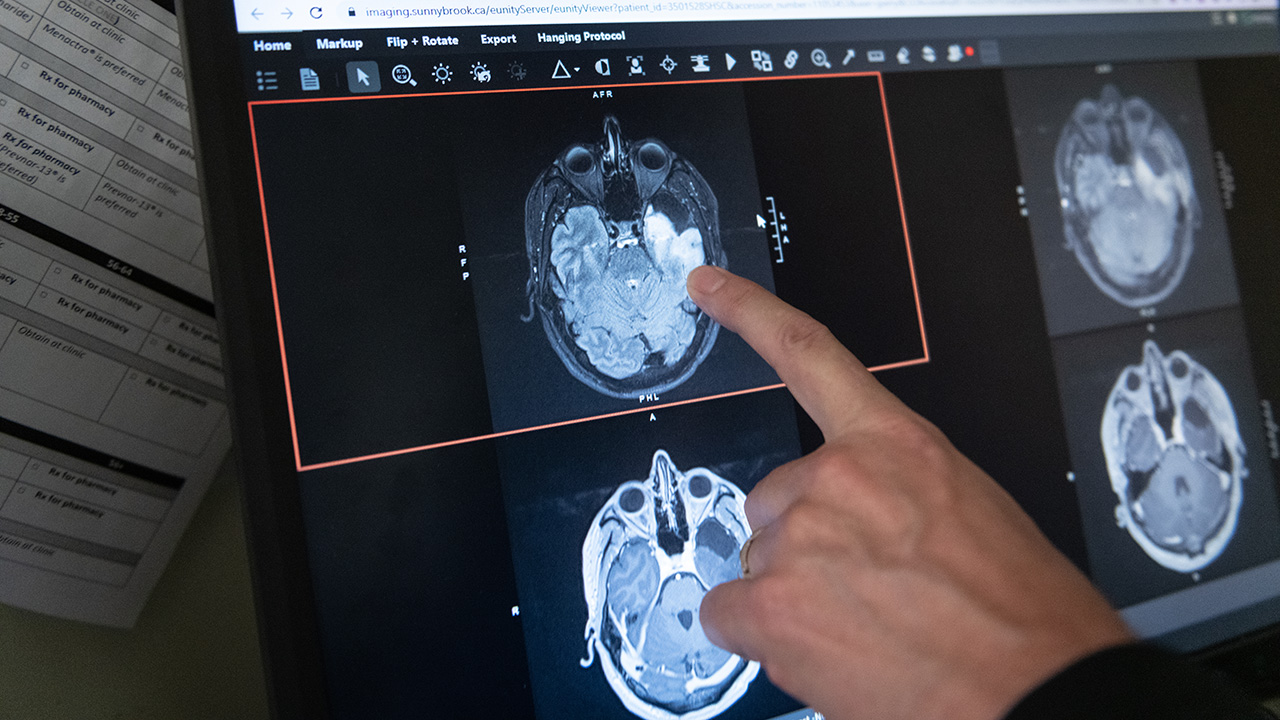Drug prolongs time before brain tumour grows back
First targeted therapy for low-grade glioma tumours studied
Treatment with a tumour-targeting drug taken in pill form significantly slows the growth of a common type of brain tumour, according to a newly-published multi-centre study co-authored by an international team of researchers, including Sunnybrook neuro-oncologist Dr. James Perry.
As part of the Phase 3 clinical trial led by Dr. Ingo K. Mellinghoff at Memorial Sloan-Kettering Cancer Centre, research participants with low-grade gliomas, taking the drug vorasidenib remained free from tumour re-growth (seen on imaging scans) for 27.7 months, as of the time of study read-out.
The drug was also shown to significantly prolong the time before patients required their next level of treatment intervention, such as surgery, radiation, or chemotherapy. At two years follow-up, over 83 per cent of patients on vorasidenib did not require further treatment compared to only 27 per cent on the placebo medication.
“For our patients with low-grade gliomas, and those of us supporting them, these results are very promising, and represent the first-ever targeted therapy for this disease,” says Dr. James Perry, one of the investigators of the trial and chairman of the Canadian Brain Tumour Consortium.
Gliomas are the second-most common type of cancer in Canadians under the age of 40 years, and the second-most common cause of cancer death. These slow-growing brain cancers spread within the brain causing disruption of neurological function, seizures, and impairment of thinking and cognition. The major risk of low-grade gliomas is their ultimate transformation into high-grade gliomas which are unfortunately difficult to control and uniformly fatal. As many as 60 to 70 per cent of patients with gliomas have the target for this new drug. Slowing the growth of low-grade tumours and delaying the emergence of high-grade disease is a huge unmet need in brain tumour therapy.
Presented by the study authors at the June 4th American Society of Clinical Oncology (ASCO) conference, and published in the New England Journal of Medicine, the study compared the drug vorasidenib with placebo pills in patients with grade 2 gliomas.
An estimated 340 patients who volunteered for the double-blinded trial were randomly assigned to receive either the oral vorasidenib tablets at a dose of 40 mg daily, or matching placebo tablets.
While the combination of radiation and chemotherapy may keep this disease at bay for some time, treatment is not curative. To delay potential long-term toxicities, many patients with grade 2 gliomas do not receive immediate chemoradiation following their initial diagnosis, and are instead monitored with serial MRI brain scans.
“The goal was to use this window of opportunity before chemoradiation to alter the disease course, with the potential to postpone the need for radiation and chemotherapy, and preserve quality of life for longer,” says Dr. Perry, also an affiliate scientist at Sunnybrook, one of five Canadian hospital research sites to enrol patients in the trial. “Drug therapies like this one – that target at the molecular level – have the greatest potential for long-term disease-modifying impact when applied at the earliest disease stage. In addition, vorasidenib has been shown to be a safe treatment with few side effects.”
Additional research will be required to determine how the drug is best used (i.e. alone or as part of a combination therapy with other drugs), and for patients with glioma who have already received prior cancer therapy or who have higher-grade (3 or 4) disease.
Patient view: Watch Steven’s story »
Update: Health Canada approves first and only oral treatment for brain cancer
I have a low-grade glioma. Will I be able to access vorasidenib?
Clinical decisions, which may include the selection of appropriate prescription medicines or the development of management plans, are completed between the patient and their healthcare team.
For patients with low grade glioma with an IDH mutation (not to be confused with glioblastoma) who meet the specific health criteria for Voranigo, their prescribing physician and healthcare team can apply for access to the medication through a patient support program managed by Sentrex Health.
If you are a patient looking for information on Voranigo, speak to your healthcare professional to find out more if you could be eligible for this medication and admissible to the Patient Support Program.
Patient view: Watch Steven’s story (Sunnybrook Your Health Matters)






